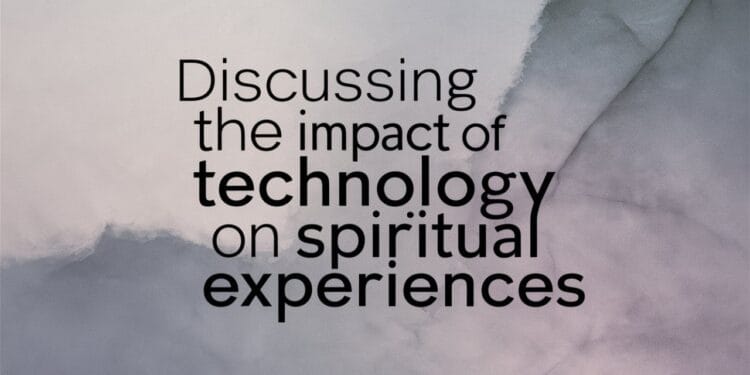No products in the cart.
Discussing The Impact Of Technology On Spiritual Experiences
This post contains paid and/or affiliate links. I make a small commission at no extra cost to you. Please see our Privacy Policy.
Technology is a big part of our lives now. It changes how we experience spirituality. We’ll look at how tech affects our spiritual paths, from personal devotion to online communities.
The Evolution of Spiritual Practices in the Digital Age
Technology has changed spiritual practices a lot. Old ways now mix with new tech. This makes it easier to connect with faith in new ways.
Access and Convenience
Prayer apps, online worship services, and digital texts have changed how we practice. These tools make it easy to fit spirituality into busy lives.
Expanding Reach
Technology has also made spirituality more accessible. Online services let people from everywhere join together. This brings people closer, no matter where they are.
- Prayer apps offer guided prayers and reminders.
- Online worship services let people join in from anywhere.
- Digital texts make sacred scriptures easy to access.
Enhancing Engagement
Digital tools make spiritual practices more engaging. Online communities let people share and learn together. This builds strong, supportive groups.
Technology helps us deepen our faith in today’s world. It makes connecting with faith easier and more fun.

Technology and Personal Devotion
Students use tech for their faith. Prayer apps and online scriptures make it easy to stay devoted. These tools help study and reflect on religious texts.
Prayer apps remind users to pray and offer guided prayers. Online scriptures make it easy to explore religious texts. This helps deepen faith.
Using tech for devotion has its challenges. But many find it helps their spiritual journey. It fits into their busy lives, making faith more accessible.
Technology adds valuable tools to devotion. It helps students access prayers and texts easily. While challenges exist, the benefits are clear in many lives.
Online Religious Communities
Online religious communities have changed how we connect. They offer support and a sense of belonging. They’re key for students far from their usual support networks.
In these communities, people discuss, seek guidance, and find comfort. Forums, social media, and virtual services meet diverse needs. They provide a space for religious connection and support.
Online communities may lack the closeness of in-person meetings. But their convenience and reach are huge. They offer flexible, inclusive experiences for modern life.
Virtual Worship Services
- Virtual worship services let people join in from home. They connect with their faith community easily.
- Live services and prayers feel real. They make everyone feel united and grow spiritually.
- Virtual worship services have interactive parts. People can comment and share their thoughts and prayers in real time.
Spiritual Support and Belonging
- Online religious communities help those who feel alone. They offer support and a place to share experiences.
- These communities are safe spaces. People can find comfort and advice from others who believe the same.
- They help people feel part of a group. This creates chances for new friendships and shared spiritual journeys.
Online religious communities are key in today’s world. They offer support and connection for those who can’t meet in person. These spaces help people deepen their faith and feel connected.
Digital Distractions and Spirituality
Technology is a big part of our lives. But it can also distract us from our spirituality. It’s hard to find time for prayer with all the notifications and social media.
But, we can find ways to balance technology and our spiritual growth. By being mindful and setting aside time for prayer, we can reduce distractions. This helps us focus on our spiritual journey.
Mindful Technology Use
Using technology mindfully can help fight distractions. It means being aware of how we use our devices. Instead of scrolling mindlessly, we can use technology to support our spiritual goals.
Mindfulness helps us stay focused on our spiritual practices. We can use apps or timers to stay on track. Being mindful of how technology affects our spirituality helps us make better choices.
Unplugged Devotion
Setting aside time without technology can also help. It lets us reflect, pray, and connect with ourselves. This time is important for our spiritual growth.
During these moments, we can focus on practices like meditation or journaling. Without technology, we can dive deeper into our spirituality. It’s a chance for deep reflection and growth.
Finding Balance
Finding a balance between technology and spirituality is key. Technology can enhance our spirituality, but it shouldn’t take over. It’s important to know when to step away from screens.
By being mindful and setting aside time for prayer, we can enjoy technology without losing touch with our spirituality. This balance helps us navigate the digital world while staying connected to our spiritual selves.
- Set limits on when you use technology, like checking notifications or social media.
- Use self-discipline to limit screen time and focus on spiritual activities.
- Do things offline that help your spirituality, like nature walks or reading spiritual books.
- Check how technology affects your spirituality and make changes to stay balanced.
By being mindful of our technology use, we can find harmony between our digital lives and spirituality. This balance lets us fully engage with our spiritual practices while enjoying technology’s benefits.
Technology in Religious Education
Technology has changed religious education a lot. It makes learning easier and fits different learning styles. Now, we can take online courses, join webinars, and listen to podcasts.
Online Courses for Flexible Learning
Online courses let students learn when they want. They can study anytime, anywhere. This makes learning easy to fit into a busy life.
Students can learn about scriptures, theology, and religious traditions. Online courses offer a personal and convenient way to learn.
Interactive Webinars with Scholars and Leaders
Webinars are great for learning from experts. They let students ask questions and share ideas. This makes learning more interactive and valuable.
Students get to learn from scholars and leaders. This helps them understand their faith better.
Insights and Discussions through Spiritual Podcasts
Podcasts share spiritual knowledge easily. They cover many topics and offer deep discussions. This makes learning fun and easy.
Students can listen during commutes or workouts. Podcasts make learning a part of daily life.
Technology makes learning in religious education better. It offers many resources like online courses, webinars, and podcasts. This makes learning flexible and personal.
Using technology helps deepen understanding and connect with experts. It enriches our spiritual journeys.
Conclusion : How Technology Shapes Our Spiritual Journeys
Technology has changed our spiritual journeys a lot. It has made our spiritual lives different in the digital age.
Technology helps us practice our faith in new ways. Prayer apps and online scriptures make devotion easier. They let us personalize our spiritual routines.
Online communities offer support and a sense of belonging. They help those who can’t be with their traditional support networks.
These platforms are great for religious discussions and experiences.
But, technology also has its challenges. Digital distractions can be a problem. Finding a balance and being mindful helps us stay focused and spiritually well.
In conclusion, technology and spirituality are connected in many ways. We need to think carefully about how we use technology.
This way, we can grow and connect in our digital world.
FAQ
How has technology impacted spiritual experiences?
Technology has changed how we experience spirituality. It makes spiritual practices easier and more accessible. It also brings spiritual experiences to more people.
What are some examples of technology in spiritual practices?
Examples include prayer apps and online worship services. Digital religious texts also make it easier to engage with faith.
How does technology impact personal devotion?
Technology helps with personal devotion. Prayer apps and online scriptures offer tools for spiritual routines. They help with study and reflection.
How do online religious communities play a role in spirituality?
Online communities offer support and a sense of belonging. They are great for students away from their support networks. They are good for religious discussions and experiences.
What are the challenges of technology in spirituality?
Digital distractions can interrupt prayer and reflection. But, setting aside time for devotion and using technology wisely helps. This keeps us focused and enhances our spiritual experiences.
How does technology impact religious education?
Technology is key in religious education. It brings flexibility and convenience with online courses. Webinars and podcasts offer interactive sessions with scholars.
They make it easy to access insights and discussions on spiritual topics.
What is the conclusion regarding the impact of technology on spiritual experiences?
Technology has changed spiritual journeys a lot in the digital age. It has both good and bad sides. But, using technology wisely can make our spiritual lives better.
It’s important to balance its use and add mindfulness to our lives.














